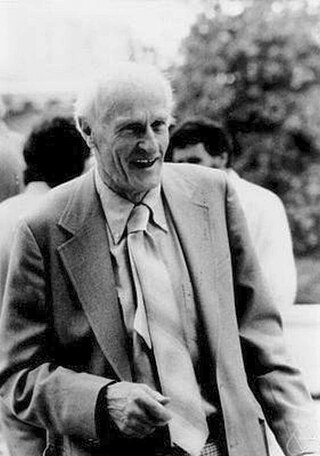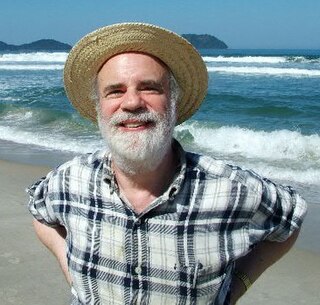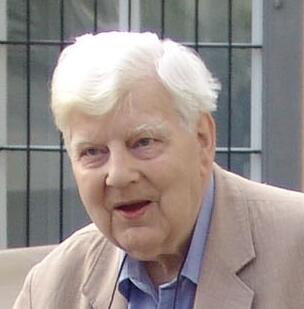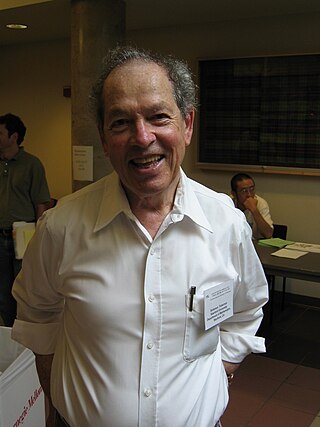Related Research Articles

An alphabet is a standardized set of basic written graphemes representing phonemes, units of sounds that distinguish words, of certain spoken languages. Not all writing systems represent language in this way; in a syllabary, each character represents a syllable, and logographic systems use characters to represent words, morphemes, or other semantic units.
E-Prime denotes a restricted form of English in which authors avoid all forms of the verb to be.

Stephen Cole Kleene was an American mathematician. One of the students of Alonzo Church, Kleene, along with Rózsa Péter, Alan Turing, Emil Post, and others, is best known as a founder of the branch of mathematical logic known as recursion theory, which subsequently helped to provide the foundations of theoretical computer science. Kleene's work grounds the study of computable functions. A number of mathematical concepts are named after him: Kleene hierarchy, Kleene algebra, the Kleene star, Kleene's recursion theorem and the Kleene fixed-point theorem. He also invented regular expressions in 1951 to describe McCulloch-Pitts neural networks, and made significant contributions to the foundations of mathematical intuitionism.

Willard Van Orman Quine was an American philosopher and logician in the analytic tradition, recognized as "one of the most influential philosophers of the twentieth century". From 1930 until his death 70 years later, Quine was continually affiliated with Harvard University in one way or another, first as a student, then as a professor. He filled the Edgar Pierce Chair of Philosophy at Harvard from 1956 to 1978.

Saul Aaron Kripke was an American analytic philosopher and logician. He was Distinguished Professor of Philosophy at the Graduate Center of the City University of New York and emeritus professor at Princeton University. Kripke is considered one of the most important philosophers of the latter half of the 20th century. Since the 1960s, he has been a central figure in a number of fields related to mathematical and modal logic, philosophy of language and mathematics, metaphysics, epistemology, and recursion theory.

Hilary Whitehall Putnam was an American philosopher, mathematician, and computer scientist, and a major figure in analytic philosophy in the second half of the 20th century. He made significant contributions to philosophy of mind, philosophy of language, philosophy of mathematics, and philosophy of science. Outside philosophy, Putnam contributed to mathematics and computer science. Together with Martin Davis he developed the Davis–Putnam algorithm for the Boolean satisfiability problem and he helped demonstrate the unsolvability of Hilbert's tenth problem.

Sir Michael Anthony Eardley Dummett was an English academic described as "among the most significant British philosophers of the last century and a leading campaigner for racial tolerance and equality." He was, until 1992, Wykeham Professor of Logic at the University of Oxford. He wrote on the history of analytic philosophy, notably as an interpreter of Frege, and made original contributions particularly in the philosophies of mathematics, logic, language and metaphysics. He was known for his work on truth and meaning and their implications to debates between realism and anti-realism, a term he helped to popularize. He devised the Quota Borda system of proportional voting, based on the Borda count. In mathematical logic, he developed an intermediate logic, already studied by Kurt Gödel: the Gödel–Dummett logic.

Solomon Feferman was an American philosopher and mathematician who worked in mathematical logic.

Edward Nicolae Luttwak is an American author known for his works on grand strategy, military strategy, geoeconomics, military history, and international relations. He is best known for being the author of Coup d'État: A Practical Handbook. His book Strategy: The Logic of War and Peace, also published in Chinese, Russian and ten other languages, is widely used at war colleges around the world. His books are currently published in 29 languages besides English.
Kenneth Jon Barwise was an American mathematician, philosopher and logician who proposed some fundamental revisions to the way that logic is understood and used.

Ivor Owen Grattan-Guinness was a historian of mathematics and logic.
The Latin term characteristica universalis, commonly interpreted as universal characteristic, or universal character in English, is a universal and formal language imagined by Gottfried Leibniz able to express mathematical, scientific, and metaphysical concepts. Leibniz thus hoped to create a language usable within the framework of a universal logical calculation or calculus ratiocinator.

Paul Bloom is a Canadian American psychologist. He is the Brooks and Suzanne Ragen Professor Emeritus of psychology and cognitive science at Yale University and Professor of Psychology at the University of Toronto. His research explores how children and adults understand the physical and social world, with special focus on language, morality, religion, fiction, and art.
Hilton Obenzinger is an American novelist, poet, history and criticism writer.
Gabrielle Michele Spiegel is an American historian of medieval France, and the current Krieger-Eisenhower Professor of History at Johns Hopkins University where she served as chair for the history department for six years, and acting and interim dean of faculty. She also served as dean of humanities at the University of California, Los Angeles in 2004–2005, and, from 2008 to 2009, she was the president of the American Historical Association. In 2011, she was elected as a fellow to the American Academy of Arts and Sciences.

Logic is the study of correct reasoning. It includes both formal and informal logic. Formal logic is the science of deductively valid inferences or logical truths. It studies how conclusions follow from premises independent of their topic and content. Informal logic is associated with informal fallacies, critical thinking, and argumentation theory. It investigates arguments expressed in natural language while formal logic uses formal language. When used as a countable noun, the term "a logic" refers to a logical formal system that articulates a proof system. Logic plays a central role in many fields, such as philosophy, mathematics, computer science, and linguistics.

The Dream of Reality: Heinz von Foerster's Constructivism is a book by Lynn Segal first published in 1986. Segal, a licensed clinical social worker, examines the constructivist epistemology of physicist and philosopher Heinz von Foerster. Originally intended as a transcription of von Foerster's lectures, the book evolved into Segal's interpretation of von Foerster's constructivism written in everyday language.
Dutch philosophy is a broad branch of philosophy that discusses the contributions of Dutch philosophers to the discourse of Western philosophy and Renaissance philosophy. The philosophy, as its own entity, arose in the 16th and 17th centuries through the philosophical studies of Desiderius Erasmus and Baruch Spinoza. The adoption of the humanistic perspective by Erasmus, despite his Christian background, and rational but theocentric perspective expounded by Spinoza, supported each of these philosopher's works. In general, the philosophy revolved around acknowledging the reality of human self-determination and rational thought rather than focusing on traditional ideals of fatalism and virtue raised in Christianity. The roots of philosophical frameworks like the mind-body dualism and monism debate can also be traced to Dutch philosophy, which is attributed to 17th century philosopher René Descartes. Descartes was both a mathematician and philosopher during the Dutch Golden Age, despite being from the Kingdom of France. Modern Dutch philosophers like D.H. Th. Vollenhoven provided critical analyses on the dichotomy between dualism and monism.
Anita Burdman Feferman was an American historian of mathematics and biographer, known for her biographies of Jean van Heijenoort and of Alfred Tarski.
Deborah Jo Bennett is an American mathematician, mathematics educator, and book author. She is a professor of mathematics at New Jersey City University.
References
- "Review of Logic Made Easy", Publishers Weekly
- Chylinski, Manya (April 15, 2004), "Review of Logic Made Easy", Library Journal : 90
- Devlin, Keith (November–December 2004), "Becoming a better reasoner", American Scientist , 92 (6): 575–576, JSTOR 27858495
- Doran, K. (December 2004), "Review of Logic Made Easy", Choice Reviews : 674
- Epstein, Richard L. (December 2004), "Review of Logic Made Easy", The Bulletin of Symbolic Logic , 10 (4): 577–578, doi:10.1017/S1079898600003668, JSTOR 3216745
- Wolf, Robert S. (May 2005), "Review of Logic Made Easy", MAA Reviews, Mathematical Association of America